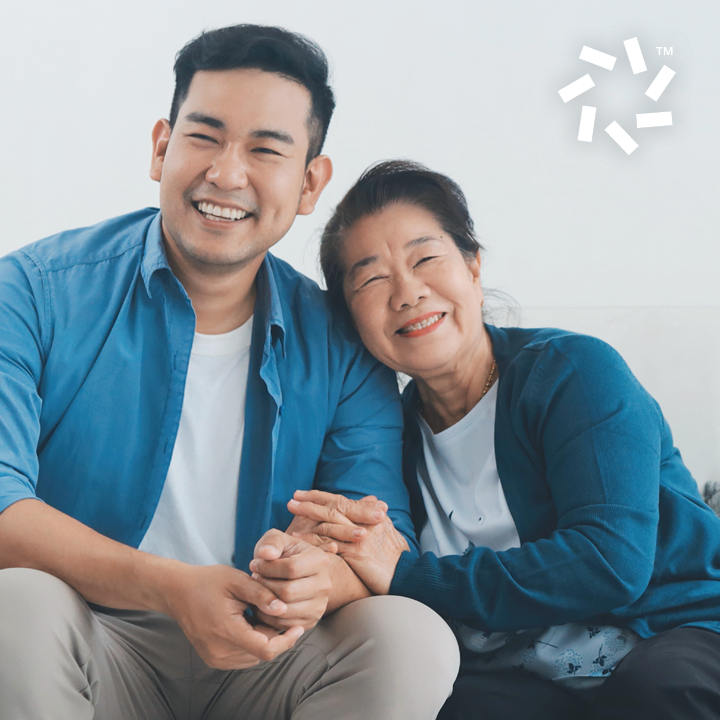
One day last summer, about a year after Dana Bushway, RN, Lifespark Life Manager, started working with Lifespark COMPLETETM member, Julie*, she got a frantic call from her client’s son and primary caregiver, Ben*.
He’d been having trouble breathing, he told her, and upon examination, the doctors had found blood clots in his lungs and were now admitting him to the hospital. “He was in tears because he didn’t have anyone to take care of his mother and thought he might have to leave the hospital against medical advice,” Dana said, adding that because Julie has stroke-induced dementia, aphasia, and a high risk of falls, he never leaves her alone for more than two hours. “I told him, ‘Ben, don’t worry—we’ve got this covered.’”
Although Lifespark wasn’t able to provide a caregiver on such short notice, Dana was given the names of several vetted resources. She made arrangements with a home care company to meet Ben at the hospital, sign the paperwork, and learn about his mother’s needs.
“Ben called me afterwards to express his thanks and to ask if I could bring his phone charger to the hospital which, of course, I would do,” Dana said. “Other than an uncle who lives in Duluth, he doesn’t have any family to help him, so in some ways, Lifespark has become his family.”
Coordinated care
Ben, who is in his mid-50s, had been living with and caring for his mother for several years, but since her stroke, he’s become her full-time caregiver, in charge of everything from making meals to doing the laundry to loading her medications in a programmable dispenser. “I give him so much credit for devoting his life to caring for his mother,” Dana said.
In addition to Dana’s support, Ben relies on Julie’s Lifespark Nurse Practitioner, Abby Evans, who manages medication changes and wound care for her legs and feet. After her stroke, Julie also had Occupational Therapy (OT) and Physical Therapy (PT) through Lifespark Skilled Home Health. Then, in August, she fell in the bathroom and broke her femur. Following her surgery, she spent two months in a transitional care facility (TCU) but was now back home, initially with some PT and OT, but now with just pain management.
“At first, pain was a huge problem for her—and for Ben, who was up all night trying to help her—but now that Abby has adjusted her pain meds, she’s doing much better,” Dana said. “Unfortunately, Ben took a fall and will need surgery on his ankle, but luckily, a friend of Julie’s can stay with her for a couple of days.”
Balancing safety with independence
As devoted as Ben is to his mother’s care and safety, he also wants to respect her privacy. “He called me one day to say that Julie hadn’t showered in a few weeks—not since her PT and OT sessions ended—but that she wasn’t comfortable having her son help her, which I totally understand,” Dana said. “She agreed to let me help her get in and out of the tub and set out her clothes, but she’s still able to wash her hair and body on her own.”
As Julie’s dementia has progressed, some of her goals have needed to change. “When we first sat down to talk about her goals and desires, she wanted to go out to eat with friends. That’s not really possible now, so instead, Ben invites her friends over for lunch,” Dana said.
Julie’s goals now are primarily pain management, avoiding falls, and living as independently as possible, she said. “That’s one of the benefits of the automated medication dispenser: it gives her a sense of control over her meds.”
Support that goes beyond the basics
Dana describes her job as helping seniors live the best quality of life possible. “I’m here to support them with whatever they need, and it’s not always about health care,” she said. “For example, when one of my clients needed to find a snowplowing service, we were able to recommend several great resources.”
From Dana’s perspective, supporting Ben is vital to maintaining Julie’s quality of life. “Between visits, he’ll reach out to ask questions and let me know what’s going on with him and his mom,” she said. “He’s always there when I come over, and afterwards, he talks openly with me about the stress and exhaustion he feels. Those conversations often end in tears.”
“I’m so glad we have this program—it’s life-changing for family caregivers and their loved ones,” she said.
To find out more, visit Lifespark COMPLETE to learn how we can help you or a loved one live as independently.
*Names have been changed to protect client privacy.


